Jill Plater
Name: JILL PLATER
Born: 26.05.1939
Date Joined April 1952
Personal Bests:
100m 13.5
200m 26.1
400m 59.5
800m 2m.23.1
1500m 5.11.0
10K 42.02
5miles 31.20
10mile 67.27
½ marathon 89.00
Marathon 3h.15m.33s
1500 to marathon times mostly when over 45
First Club Race:
May 1952 – Inter club meeting at Tooting Bec – 2nd junior 150yds, 1st junior 4 x 110 relay
Favourite Race:
Any 400m
Notable Performances:
Represented Essex Schools in the sprints at the All-England Schools’ Champs 1953 and 1954
Medal winner at National track junior champs in both 60y and 100y in 1953 and 1954
Represented Essex in the Inter-County Champs for the 400 in 1960’s
Numerous medal wins in the Southern and National Vets Champs – track and cross-country
First marathon attempt days before 45th birthday to finish in 3h15m33s
Broke the British over 50 800m record in the British Champs in Glasgow
Biggest Disappointment: Trained to compete in the over 60 400 and 800 World Vets champs when being held in Scotland but suffered a pulled tendon a matter of weeks before the event. Otherwise no major disappointment but as the years go by realise I could have done better if I’d trained harder but didn’t realise this until I was in my mid 40’s. All my years of training with Ilford AC were fun and I wouldn’t change a thing.
Typical Weeks Training at your peak.
After 68 years with the club I’m not sure I can remember if and when my peak was or even if I have yet peaked!
Training during my years as a sprinting junior was mostly repetition 100’s and 200’s and starting practice – we trained 3 times a week at the track in the summer and only on Sundays in the winter (no floodlights).
As a senior:
3 track sessions per week, one road run, one country run
Track sessions were usually sets of 800’s, 600’s, 400’s, 300’s, 200’s and sometimes a mixture of these distances.
As veteran: marathon training :
Mon: 7 miles road
Tues: track session
Wed: 5 miles road
Thurs: track session
Fri: rest
Saturday: long run – from 10 miles building up to 20 miles
Sunday: Easy road or country run
Favourite Sessions:
Repetition 300’s on the track
Favourite race distance
400m
Favourite event – Track, Road or Cross Country
Track first, Road second, definitely not cross country
What advice would you give our current crop of youngsters
Enjoy your athletics – the training and the social aspect
How would you improve the sport
Life ban for drug abuse and more financial support for grass root athletics particularly to train aspiring coaches and field and track officials.
Favourite Athlete or Sportsman:
Seb Coe and Steve Ovett
What other sports do you follow:
Tennis, snooker, not football although I was a West Ham Supporter when their weekly wage was £12 – do follow Liverpool as grandson is an ardent fan and did the Anfield tour with him last year for his birthday present
Best Country Visited
The American canyons
Favourite Food & Drink :
Any fish and a decent white wine
Favourite TV Shows:
Not a huge TV follower but enjoy Question of Sport, University Challenge, anything with Monty Don, British crime dramas, country programmes
Last Film Seen :
At the cinema with said grandson to see the latest Star Wars film
Last Book Read
An Officer and a Spy by Robert Harris – an amazing storyteller
Favourite band/singer:
Mainly from the 60’s – Beatles, etc.
Any Pets: No
What are your aims for next season
At the age of 81 it’s mostly to continue to be able to put one foot in front of the other, although I still do a couple of runs a week, albeit slowly
Tell us a Joke:
Why was the Olympian not able to listen to music?
Because he broke the record
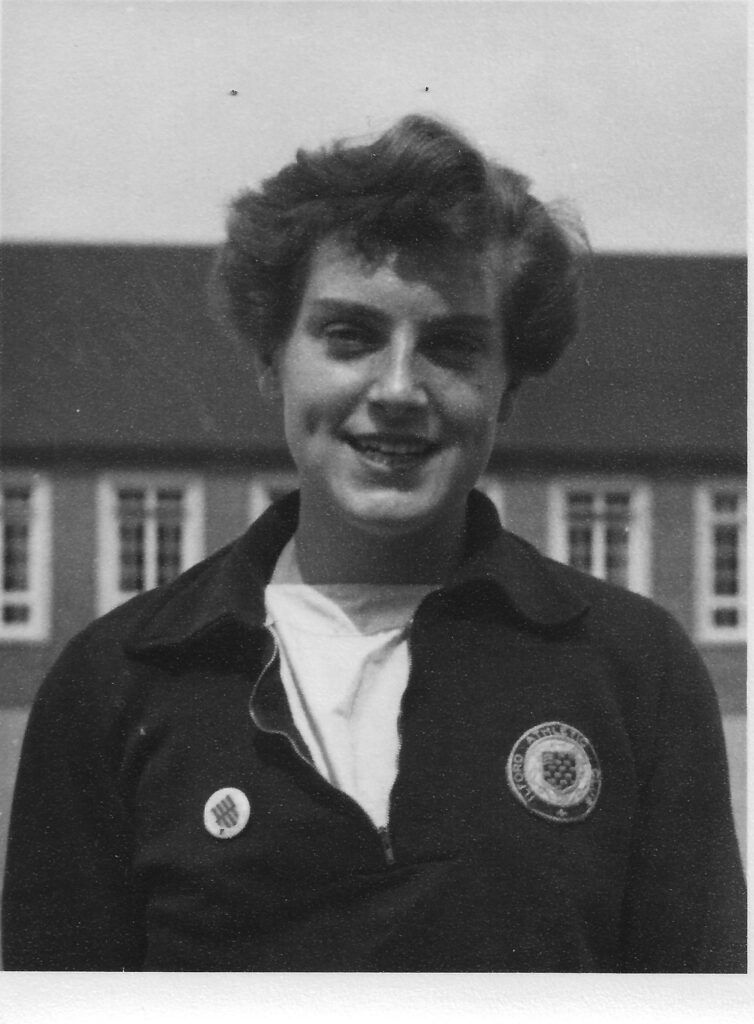
First ever tracksuit!

Ilford team winners of the Lilian Board trophy 4 x 400m Pat Bailey (Nixon), Jill Pettit, Jill Plater, Jan Blackwell

100 x 1 mile at Cricklefields (a very young Kim Webb can be spotted)
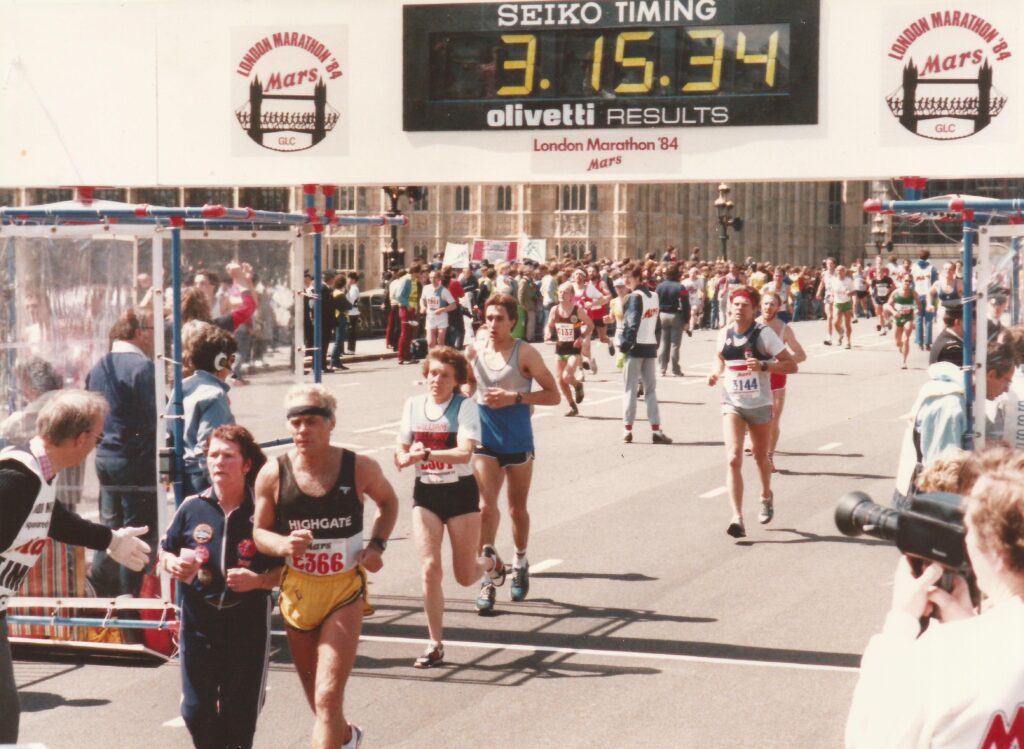
1984 London Marathon
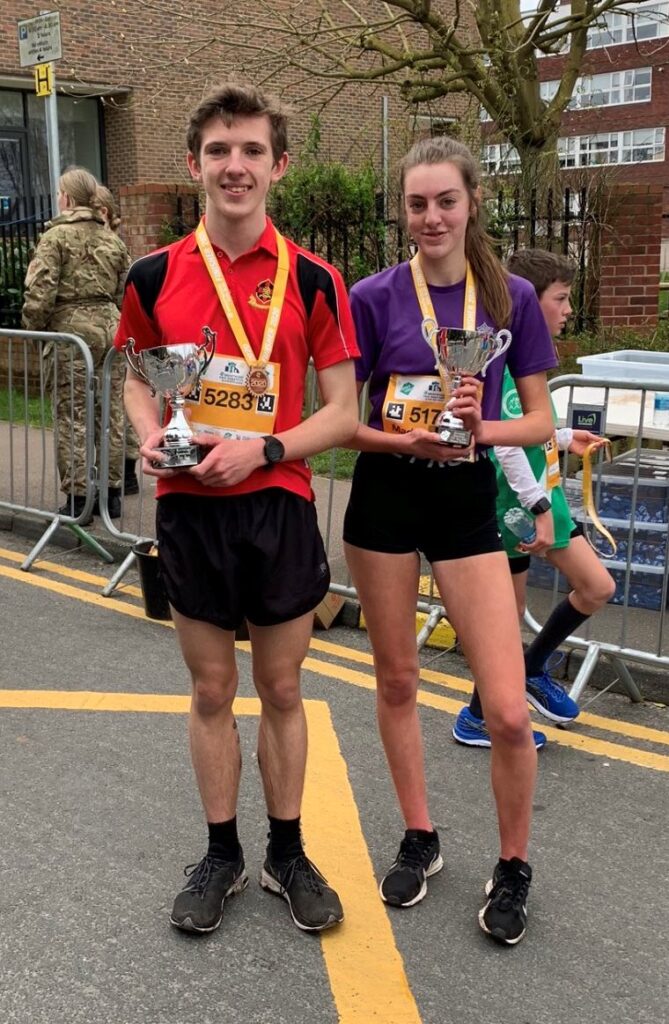
Granddaughter Maddie (then aged 14) first female in Brentwood Fun Run a week before lock down

with Paul Grange and family August 2020
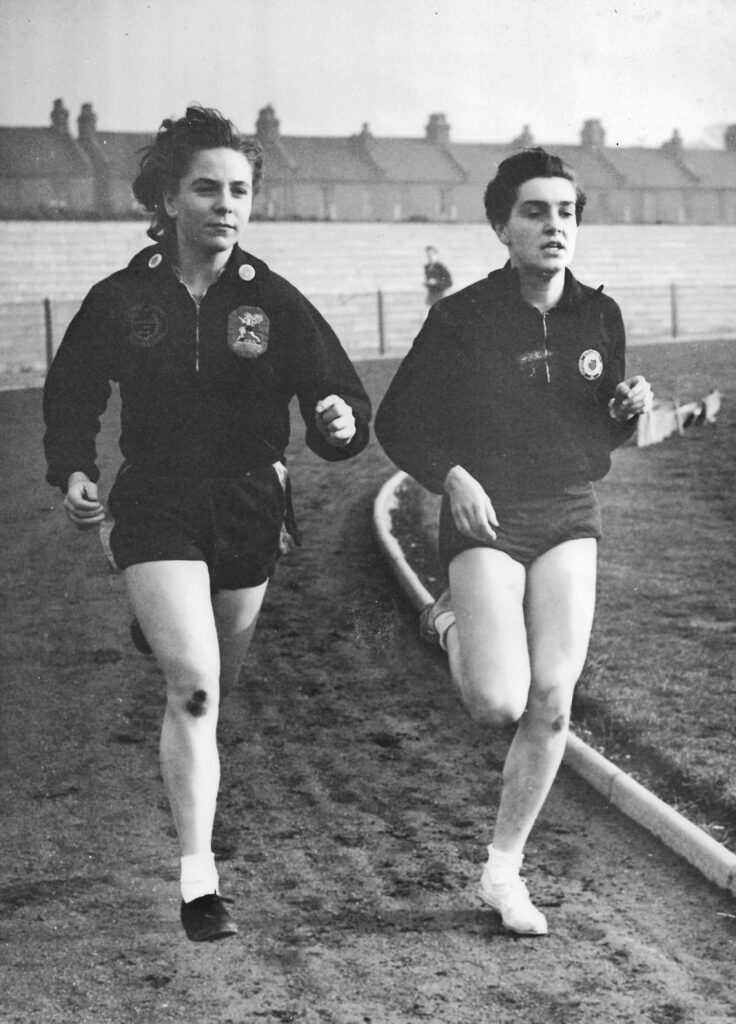
training with Val Surety (Cutting) in the early 1950’s
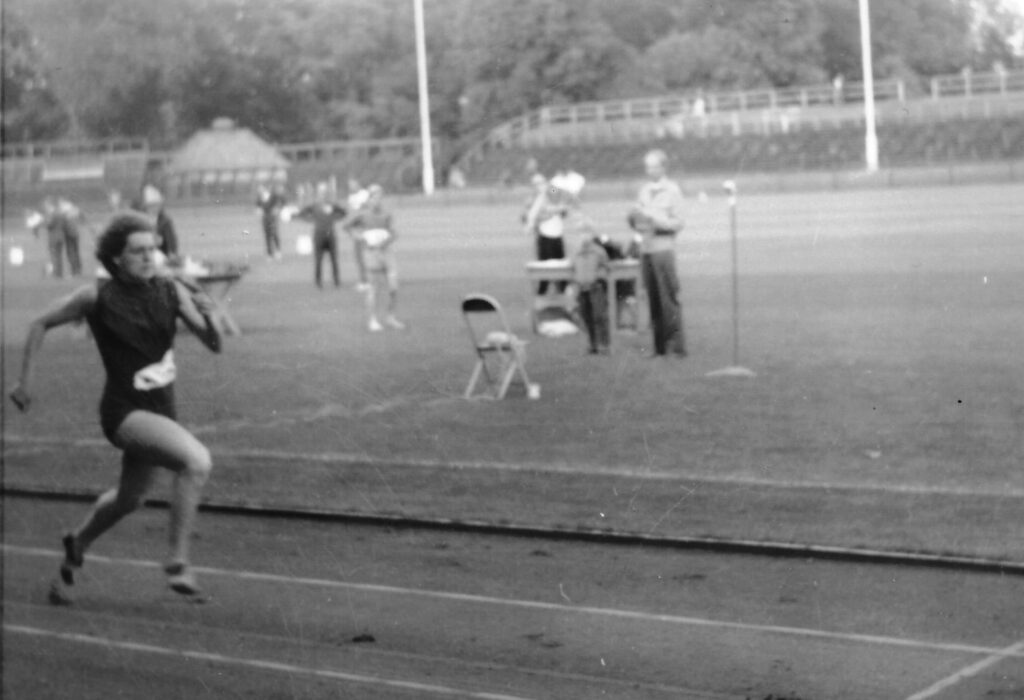
Winning the 400m during Ilford’s Swedish tour (wearing the all-in-ones that we bought in Sweden and were not allowed to race in and banned by an Essex official!

Being narrowly beaten by Pam Wyatt (Ilford) in the 100
JILL ANSWERS YOUR QUESTIONS:-
JILL PLATER
Why did you move from sprinting to the Marathon ?
I didn’t do much short sprinting as a senior as I had moved up to 400metres. Distance training and racing were new challenges but I continued to train and race on the track at the same time.
Favourite Park Run and time ?
Yet to do one, so this could be my next challenge!
What’s the reason the onesie outfit was banned by an Essex Official ?
Although they didn’t reveal any more of the body than vest and shorts, unlike today’s lycra affairs, one Essex official didn’t like their figure hugging shape and thought they were too seductive. I have to add that this Essex official was a member of Essex Ladies and not at all keen on Ilford ladies.
Worst Injury ?
Played hockey for the school and sustained a nasty knee injury caused by a fast, hard hockey ball – had a swollen knee for days and it has continued to cause me problems since then, although so far have avoided a knee replacement.
What do you consider your greatest running Achievement ?
As a track athlete I think I was most pleased with my first effort at a marathon with a 3hrs15m time which, in those days, was timed from when the gun went and not, as today, when you crossed the start line.
What was the first Single and Album you bought ?
A 78 Elvis Presley when a schoolgirl – really can’t remember the first album but don’t think that, as a youngster, I could ever afford one.
Favourite place for a long run ?
Always enjoyed the Bournebridge 7 from Chigwell Row although don’t know why as it is a challenging run.
What in your opinion is the greatest British male and female sprinter of all time ?
Dorothy Hyman has been our most successful sprinter winning the silver medal in the 100 and bronze in the 200 at the 1960 Olympics. Dorothy also took the 100 gold and 200 silver at the 1962 European Champs and gained many other international medals.
As a youngster the male sprinter I admired was Emmanuel McDonald Bailey. He made the Olympic 100 final in the 1948 and 1952 Olympics, taking the bronze medal in Helsinki in 1952. In 1951 he equalled the 100 world record (10.25) set by Jesse Owens in 1936 and held it until 1956. My one and only pair of starting blocks had the trade name ‘McDonald Bailey’ written along the side. McDonald Bailey died in 2013 at the age of 93.
What is your biggest disappointment in Running ?
Always enjoyed my running and although I probably didn’t run as well as I should have on many occasions I don’t count them as big disappointments.
How has the Club changed over the years ?
The Club used to be very much a track and field club with large numbers of male and female athletes training throughout the week at Cricklefields. There were always plenty of youngsters joining and often fierce competition to make the sprint relay teams. The junior sprint girls were assigned to the far side of the track and not allowed to get in the way of the older athletes. Ilford had many fantastic throwers trained by excellent coaches. There used to be numerous track meetings – trophy meetings, handicap meetings – and we would meet at Ilford Station and all travel on the train together to South London, Kent, etc. Great camaraderie and great fun. Something that Ilford is good at and it continues today. I’m not involved with the Club these days but obviously there’s a lot more emphasis on road and country running
Observing your training and the recent training you girls would have done, how would you say training has changed over the years?
As junior girls we could not race further than 150 yards therefore we concentrated on speed work. Although today we still have sprinters and hurdlers so many young girls and boys now train for road and cross-country races and the middle distances on the track from the age of 11. It’s the way of the world but so often these youngsters give up by the time they are 17 or 18.
Did you meet your husband at the club, and can you tell us about his time as a runner?
Yes, Dennis joined Ilford a year or two before me. He was an excellent distance runner and held the Club Marathon record (2h20m29s) from 1964 until Andy beat it by 35 seconds in 1985. Dennis ran for Great Britain in the Kosice marathon in 1964 where he finished 2nd. Dennis is 8th on Ilford’s rankings for 10 miles (49m3s), 6th over half marathon (1h7m), 4th over 20 miles (1h44m58s), and 2nd in the marathon. He still ran until his early 60’s when he had two hip replacements.
You mention that most of your PB’s at distances of 1500m and upwards were done as a vet. Was this in effect a ‘second running life’ and the track running was left behind at this point?
No I still did track training and raced mostly over 400m as a vet but increased my weekly training sessions to include some road running to improve my stamina.
Some very impressive times in the longer distances – do you ever wonder if these would have been even better if you had done them earlier?
Possibly, although I think I had more determination and discipline to train when I was older.
As watches were pretty basic then, was your training runs done purely on ‘time’ or did you try and best guess a distance when you ran?
Training runs were over a known mileage. I didn’t own a stop watch until in my 40’s and then it was a bog standard one but it did make me work harder on training runs.
When you broke the over 50 British 800m record, was this a target at the time that you had been aiming at or a pleasant surprise?
The 400m, which I also won that weekend, was my main event so the 800m record came as a surprise.
Do you still keep in touch with anyone from your time running at the club?
Yes, numerous. At least 8 Ilford old ladies came to my 80th! Also still keep in touch with an even older group of far flung Ilford athletes and until a few years ago used to meet up regularly in the Cotswolds for a walking weekend. Unfortunately their numbers are declining now.
Do you think your granddaughter Maddie will become a keen runner?
Maddie is a very keen runner, trains hard and enjoys the training and the camaraderie – but who knows how long it will last.
Having seen pictures of the old track at Cricklefield, do you think you would have been any better had you trained on a modern day track?
I’m sure the modern track surfaces would have produced faster times than on the old cinder ones.
Similarly do you think modern watches and shoes would have helped you, or do you think nothing beats hard work and natural talent?
Hard work and natural talent win every time
Who were the big characters around the club during your heyday? Any stories that may embarrass them?
There were so many big characters in those days, particularly people like Alan Perkins and Phyllis. Phyllis along with Muriel Critchley and Joan Dryden broke the 3 x 800 world record in 1952. Phyllis continued for many years to compete at a national level on the track and country.
I don’t think this will embarrass anyone, but while on the Ilford AC Swedish tour Don Owers had formed a relationship with Pat Stanley and hoping to impress her, took her out for dinner in Halsingborg one evening. Everything was fine until he came to pay and found he did not have enough money and neither did Pat. It took some persuading but eventually the restaurant allowed him to leave Pat there as a deposit while he raced back to our quarters to borrow some money. It didn’t put Pat off as they married a couple of years later.
Who was your coach and who was your favourite other athlete on training nights?
The one and only Fred Plumm was the ladies’ coach – he was an avid reader and was particularly interested in how Russian sprinters were trained. He was innovative in his relay coaching and Ilford ladies were probably the first club to use the relay change over method of standing alternately on the inside and outside edge of the lane to avoid having to change the baton to the other hand and therefore improve times. Enjoyed training with Val Surety (Cutting) as a junior and Alan Lovett, with his chat, was marvellous at keeping you entertained on the long road runs.
If you could go back and watch any singer or band in their heyday with a backstage pass for after who would it be?
None – not my thing!
